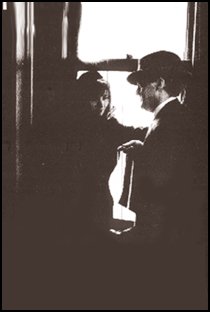Why would a Shakespearean company tackle the "hardboiled" detective genre? When delving into Robert G. Egan's adaptation of Raymond Chandler's short stories Goldfish and Red Wind, many Shakespearean similarities kept striking me.
First, these genres are both guided by their unique use of language. Chandler's dialogue is as particular an echo of his time and place as anything of Shakespeare's. Both are filled with the rhythm and slang of their own eras, yet each is heightened beyond the average speaker's abilities. Those of us excited by Shakespeare are usually excited by words, and Chandler can also gives us that verbal thrill.
But the thrill isn't exclusively verbal from either of these writers. They both know the power of action. We may not be wielding our swords in this piece, but a well placed punch or a quickly leveled gun can give a similar tingle.
One of my favorite similarities is how each fills their stories with such a rich, varied, and vivid world of characters. Shakespeare's royalty becomes Chandler's wealthy and Elizabethan groundlings transform into the modern working stiff. Both authors turn their eyes upon the entire range of their society and through their eyes we recognize our own.
While not exactly Shakespearean, Chandler's creation of Marlowe is a modern day knight. He spends his days aiding those that need his help-searching for the answers that bring the truth to light. Above all, like a knight, he follows a moral code that is unbendable-no matter the consequences. It is no accident that an early draft of the character had his name as Mallory. This questing hero (even without the armor) attracts the romantic side of the Shakespeare lover. We are able follow Marlowe's struggles as intimately as any of Shakespeare's great creations-Henry V, Hamlet, or Richard III (to name a few), and through their personal stories, a larger one is told.
There are many other similarities as well, including the use of multiple locations, direct audience address, and the careful blend of comedy and drama. So a Shakespearean company would perform Chandler, because most of the elements that drew us to the Bard in the first place abound in this genre. We feel oddly at home (and thoroughly happy) when working on Pearls & Marlowe.
Dana Marley-Kolb
Raymond Chandler (1888-1959)
Raymond Chandler has long been known as one of the classic authors of "hardboiled" detective fiction. More recently, he had been recognized as a major writer who stretched and transformed a popular genre, wrote a number of important screenplays, and made a lasting contribution to American folklore with his detective-hero, Philip Marlowe. Born in Chicago, raised and educated in England, Chandler returned to the United States after extensive combat experience with the Canadian Army during World War I. His first career, as a manager with a Southern California oil company, was cut short by the Depression. Chandler turned to professional writing in 1933 at age forty-five, submitting stories to the "pulp" mystery magazines which were then at their height of popularity. The success of his short stories led him to the writing of full-length novels, and their success soon led to recognition by Hollywood, both in films based on his novels and original screenplays by Chandler himself. In the course of his lifetime, Chandler wrote seven novels including such classics as THE BIG SLEEP, THE LITTLE SISTER, and THE LONG GOOD-BYE, all featuring Philip Marlowe. Beginning in 1944 with Edward Dmytryk's MURDER MY SWEET, eight films have been made from Chandler's works. The character of Marlowe has been portrayed by actors as diverse as Dick Powell, Humphrey Bogart, Robert Mitchum, and Elliot Gould. Chandler earned Academy Award nominations for his screenplays of DOUBLE INDEMNITY and THE BLUE DAHLIA, as well as writing the Hitchcock classic STRANGERS ON A TRAIN. - Dr. Robert G. Egan

Pearl's and Marlowe
Photo: Jerry Neill